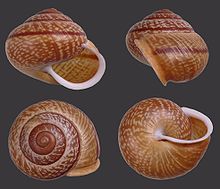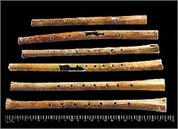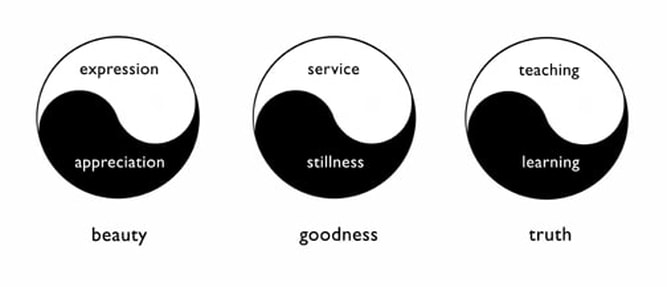"All of Chinese music relates to the unchanging Primal Vibration (which is represented dronally as the fundamental tone of the harmonic series). This Primal Note changed through the centuries, so while one could compose Chinese-style music grounded in F (as it was for many centuries), other kingdoms re-measured their world and re-pitched their instruments to G or other notes (thus, the Primal Note changes depending on who is in power!!). The huang chung foundation tone was created by a pipe generating that perfect “yellow tone.” The pipe’s length became the standard unit of Chinese measurement. The Chinese unit of volume was determined by the amount of rice it could contain. The weight of all that rice in the pipe became the standard unit of weight. The volume of the sounding of the pipe’s pitch became the unit of volume. Thus did music become the Holy Grail of Chinese civilization." (Reference of the flutes pictured here can be found at this website.) All cultures may pride themselves that their music is "universal." Plato and Confucius and a hundred other philosophers have argued about the TRUTH in their music. I tend to shy away from find a "truth." But I find inspiration inside different cultures' music theories; it excites my imagination. It is in the collision of theories (between cultures' conceptions of music) that new ideas spark.  My next post will be about how I prepare ideas to communicate my intentions to performers...and why, whatever I do, performers interpret what they want to see and understand what they want to do, no matter my intentions. That to be a composer in the early 21st Century USA, you must cheerfully give yourself over to the mis-interpretation of your music...and why that is a good thing. This extract is from The Republic by Plato, Book III (398-403). "And therefore, I said, Glaucon, musical training is a more potent instrument than any other, because rhythm and harmony find their way into the inward places of the soul, on which they mightily fasten, imparting grace, and making the soul of him who is rightly educated graceful, or of him who is ill-educated ungraceful: and also because he who has received this true education of the inner being will most shrewdly perceive omissions or faults in art and nature, and with a true taste, while he praises and rejoices over and receives into his soul the good, and becomes noble and good, he will justify blame and hate the bad, now in the days of his youth, even before he will recognize and salute the friend with whom his education has made him long familiar. A full transcript of Plato's comments on music can be found here. I do not have special knowledge. Thousands and thousands of scholars and theorists have made deeper studies of Plato's words, shared above. And among millions of musicians over the millennia, I have taken inspiration from Plato's descriptions of the power of music and aspired to compose music that can serve listeners' pursuit of the "good, true and the beautiful." My practice. Beauty. Composing and listening to music. Goodness. Contemplating/observing how music is received and used in the world and then what I might do to serve. Truth. Sharing what I know and learning from those willing to share what they know. Making beauty. The pursuit of beauty is uncompromising and relentless. And by beauty, I don't mean pretty or attractive to the exclusion of all other things that need to be expressed. The beauty I work to express gives the listener an experience to shrewdly perceive omissions or faults in art and nature. What does THAT mean? It means that music of every sort, from every time and place and rooted in every culture creates an experience for every listener and provides an experience that requires something from the listener (me). And the tools I have used explore extremes with every sort of example that I can imagine within the boundaries of the polarities:
|
AuthorComposer-producer-cellist-teacher-executive director of Composers Institute, a Minnesota nonprofit empowering the creative work of musicians in week-long intensive experiences. More info at composersinstitute.org. Archives
April 2024
Categories |



 RSS Feed
RSS Feed